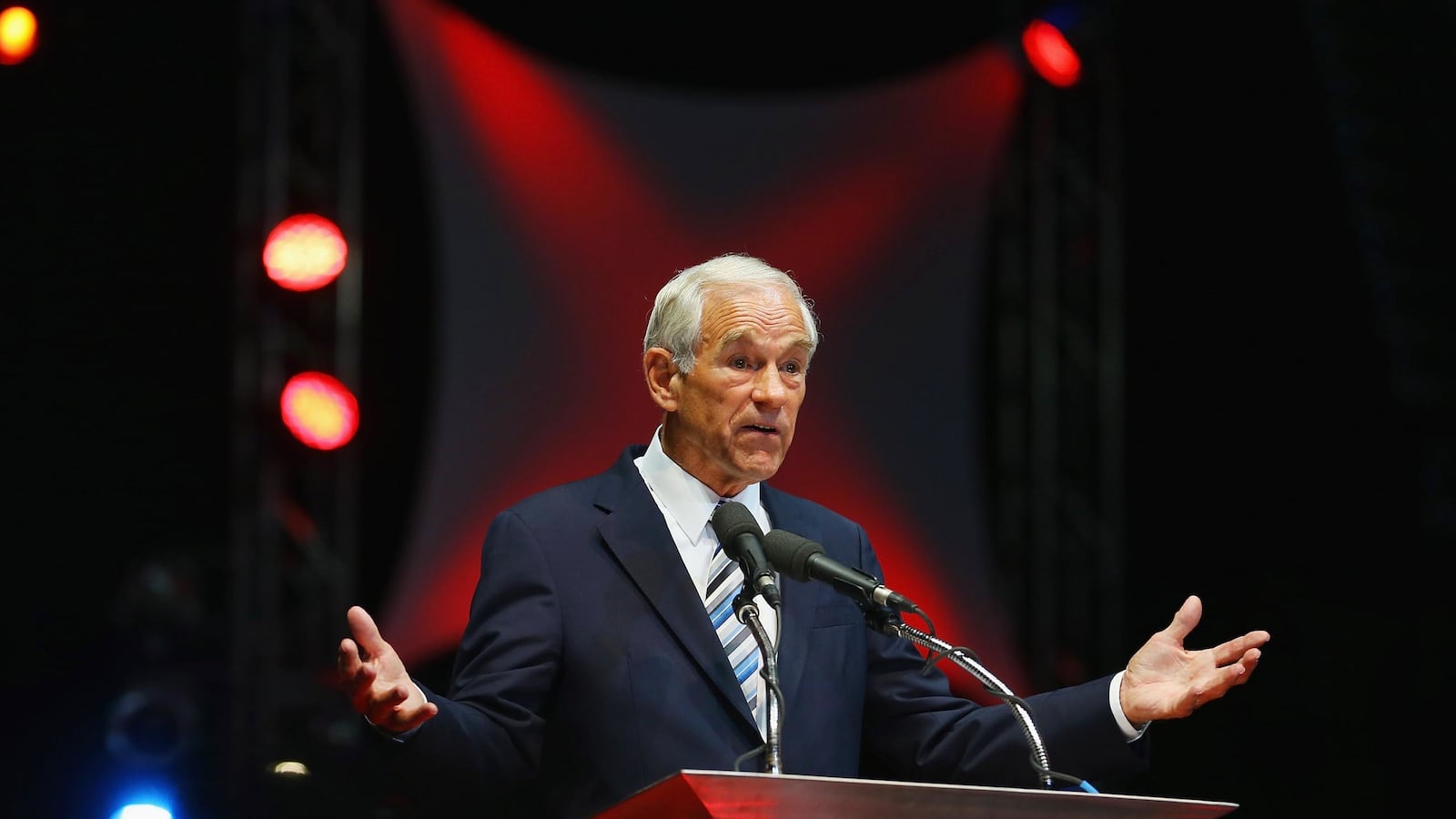In December 2011, when Ron Paul was leading the Republican presidential-primary pack in the Iowa caucuses, the former Texas congressman’s notorious newsletters resurfaced in the national debate.

The newsletters’ content—a toxic stew of racism, homophobia, anti-Semitism, sympathy for right-wing militia movements, and support for a litany of conspiracy theories—had been revealed by this writer in 2008. But Paul’s latter-day resurgence, particularly with young voters and the Tea Party, provoked a renewed round of interest in his shady associations and fringe beliefs. The title of a front-page article in The New York Times, “Paul Disowns Extremists’ Views but Doesn’t Disavow the Support,” neatly encapsulated Paul’s strategy of appealing to the far right while stopping just short of explicitly endorsing their views.
The Times story focused on the role of Lew Rockwell, Paul’s former congressional chief of staff and later vice president of the company Ron Paul & Associates, which published the newsletters. Paul always denied authorship, insisting that unknown staffers produced the publication; several sources subsequently fingered Rockwell, now the head of a small think tank in Alabama called the Ludwig von Mises Institute, as the lead writer. In an interview with the Times, Paul distanced himself from Rockwell. “They enjoyed antagonizing people, to tell you the truth, and trying to split people,” he said of Rockwell and Murray Rothbard, another libertarian writer who published a separate newsletter with Rockwell that, among other Lost Causes, supported the gubernatorial candidacy of former Ku Klux Klan Grand Wizard David Duke. “I thought, we’re so small, why shouldn’t we be talking to everybody and bringing people together?”
Paul’s media sympathizers stressed the image of a man who, far from being a peddler of racist and conspiratorial drivel, was, at worst, someone whose broad-minded libertarianism led him to be a tad too indiscriminating in his associations. Rockwell’s batty beliefs (here he is just a few days ago likening security checks after the Boston Marathon bombing to Nazi Germany), they insisted, should not damage Paul’s reputation.
As difficult as it was then to believe that Paul had no role in the production of newsletters written in his own name and which netted his family over $1 million per year, or that he did not even know who was writing them, it is now impossible to extricate Paul from the extremist views of his hangers-on. That is because Paul, who retired from Congress in January, has decisively thrown in his lot with a bevy of conspiracy theorists, cranks, and apologists for some of the worst regimes on the planet.
On April 17, Paul announced the creation of a new think tank, the Ron Paul Institute for Peace and Prosperity, which, according to its website, “continues and expands Dr. Paul’s lifetime of public advocacy for a peaceful foreign policy and the protection of civil liberties at home.” Sitting on the advisory board is none other than Rockwell.
If Paul “disavow[s] those positions” expressed in the newsletters, as he adamantly told the Times less than two years ago, then why would he place their presumed author on the board of a think tank bearing his name?
But Rockwell isn’t the nuttiest of the people associated with the institute—not even close.
That honor likely belongs to the Dickensian-named John Laughland, a British writer who has never met a Central or Eastern European autocrat he didn’t like. A prominent defender of the late Serbian President Slobodan Milosevic, Laughland penned a book on his Hague war-crimes trial titled Travesty (the “travesty” in question not being the Bosnian Serb genocide of Muslims, which Laughland denies ever took place, but the “kangaroo court” that brought Milosevic to justice and which Laughland blamed for his 2006 death). Laughland has also defended Ukraine’s Kremlin-backed president Viktor Yanukovych (whose attempt to steal the 2004 election sparked that country’s peaceful Orange Revolution) and lamented the fate of Belarusian President Alexander Lukashenko, Europe’s last dictator, victim of “humiliating treatment” at the hands of a “propaganda campaign waged against” him “by the West.”
Animating Laughland’s defense of these loathsome individuals is his belief that “Washington is promoting a system of political and military control not unlike that once practiced by the Soviet Union.” But the common thread uniting these alleged victims of Western imperialism is their resistance to the democratizing, liberal reforms insisted upon by the U.S., the European Union, and NATO, not to mention their chumminess with Vladimir Putin’s Russia.
Laughland is joined in this venture by fellow Ron Paul Institute board member and Oxford historian Mark Almond. The two are trustees of a sinister and deceptively named organization, the British Helsinki Human Rights Group (BHHRG), which trades on the good name of the international civil liberties monitoring organizations founded as a result of the 1975 Helsinki accords.
The BHHRG was an early defender of Milosevic and Serbian behavior in the Balkans generally; Laughland has argued that it is NATO leaders, and not the wartime Serbian political and military leadership, who should be tried for war crimes. (Laughland has long claimed that reports of Serbian-created mass graves in Kosovo were either fabricated or exaggerated). Almond referred to Belarus’s 2006 presidential election as a “landslide” for Lukashenko, “demonized” because “after the death of Slobodan Milosevic, the West did not need to look far to find another bogeyman.” The election results were rejected by the Organization for Security and Cooperation in Europe; EU leaders deplored the farce as “a sad exception ... on a continent of open and democratic societies.”
In addition, the BHHRG regularly advocates positions that regurgitate Russian nationalist talking points, minimize xenophobic and illiberal attitudes prevalent in the former Eastern bloc, or excuse authoritarian tendencies. Its website, for instance, claims that the Baltic republic of Latvia was “incorporated” into the Soviet Union, not violently invaded by Stalin (who sent over 100,000 Latvians to the gulag) and occupied for nearly half a century, all of which is a “myth.” Daniel McAdams, Paul’s erstwhile congressional foreign-policy adviser and the new executive director of his institute, who has “monitored” elections for the BHHRG, published an article for Rockwell’s website referring to Lukashenko’s “authoritarianism” in scare quotes.
Next on the list of Paul Institute board members are the 9/11 conspiracy theorists. Most prominent among them is Judge Andrew Napolitano, a legal analyst for Fox News who has said that “It’s hard for me to believe that [7 World Trade Center] came down by itself” and that the 9/11 attacks “couldn’t possibly have been done the way the government told us.”
He is joined by Eric Margolis, who, despite an apparent lack of a Ph.D. or appointment at an institution of higher learning, is listed as a member of the organization’s “academic board.” Margolis says that “conclusive proof still lacks” connecting Osama bin Laden to the 9/11 attacks and has speculated that the events could have been “a plot by America’s far right or by Israel or a giant cover-up.”
Southwestern Law School professor Butler Shaffer, in an article for Rockwell’s site titled, “9/11 Was a Conspiracy,” asks, “In light of the lies, forgeries, cover-ups, and other deceptions leading to a ‘war’ in Iraq, how can any intellectually honest person categorically deny the possibility of the involvement of American political interests in 9/11?”
And what would an enterprise featuring Ron Paul be without a little Civil War revisionism? For that, there’s Walter Block, an anarcho-capitalist professor of economics and fellow at the Mises Institute. Like many in Rockwell’s neo-Confederate circle, Block believes that the wrong side won the “war against Southern succession” and blames most of America’s current problems on “the monster Lincoln.”
Also on Paul’s board are prominent former government officials who claim that American Jews constitute a “fifth column” aimed at subverting American foreign policy in the interests of Israel. Michael Scheuer, a former CIA intelligence officer, has used this precise phrase, alleging that a long list of individuals, organizations, and publications are “intent on involving 300 million Americans in other people’s religious wars.”
There is nothing inherently wrong with noninterventionism. It goes astray, however, when its adherents—in order to justify their belief that the U.S. should effectively not have a foreign policy—whitewash authoritarians abroad. People like Rockwell, Laughlin, Almond, McAdams, and the others associated with the Ron Paul Institute so hate “the state” (though, curiously, only the Western ones) that they can see only the basest motivations underlying American foreign policy. Laughland, for instance, attributes Western misgivings about Lukashenko to the fact that he “is not given to taking orders,” rather than, say, the fact that he “disappears” his political opponents or jails people for clapping in public. They have crossed the line from a belief that the U.S. should “mind its own business” to explaining that the reason we should do so is because the regimes we’ve been told to be wary of by the shapers of American foreign policy are in fact righteous victims and national liberators.
What’s so ironic is that so-called libertarians are defending nationalist politicians who never hesitate to use the full powers of the state in quashing the personal freedoms of their citizenry (witness the bizarre spectacle of McAdams, who advocates a massive reduction in the size and scope of the American government, here defending the chosen successor of Venezuelan President Hugo Chávez, a revolutionary socialist who nationalized everything he could lay his hands on, against a nonexistent, American-backed “color revolution” to unseat him).
In the Ron Paul Institute, we see a group of people supposedly prioritizing limited government and personal freedom shilling on behalf of regimes which have actually implemented the very sort of surveillance state policies these civil liberties obsessives routinely cry are being imposed on unsuspecting Americans by Democratic and Republican politicians alike.
This is not classical liberalism, but rather anti-government (more specifically, anti-American government) extremism. “Being a friend of the U.S. government does not make someone my enemy, just as being an enemy of the U.S. government does not make someone my friend,” the prominent libertarian thinker Tom Palmer has written in response to the geopolitical posturing of Paul, Rockwell, the BHHRG, and their ilk. “To believe otherwise is to confuse being in favor of limited government and the rule of law with being simply ‘anti-government.’”
Asked by The Daily Caller’s Jamie Weinstein about some of the more controversial beliefs expressed by his board members, McAdams coolly replied that, “Dr. Paul is not horrified by diversity.” It’s a strange definition of “diversity” that has no moral qualms associating itself with genocide denial and apologies for tyranny. But it cannot surprise anyone at this point that the sorts of things that horrify decent people do not horrify Ron Paul.





